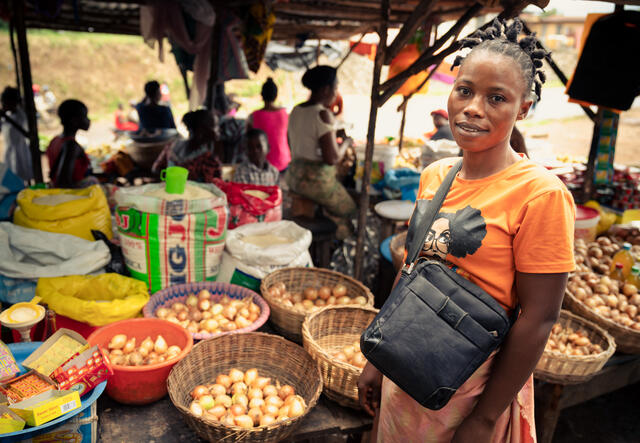Two years ago, the International Rescue Committee commenced implementation of the Futuremakers’ entrepreneurship project funded by Standard Chartered Foundation. The project was delivered in Kenema, Sierra Leone and Kousséri, Cameroon against the backdrop of poverty, gender-based violence, a lack of access to financial products and the lingering effects of the COVID-19 pandemic.
With funding of $1 million USD, the project sought to uplift young market-stall owners - particularly women. The initial phase of the project, which ran from 2021-2022, saw 93% of participants in Kenema secure access to loans and a 115% increase in average monthly household income in Kousséri. As the second iteration of the programme comes to a close, the IRC is proud to announce that 845 young people have been impacted, including 84% women and girls.
Learn more about the Kenema Recovery from COVID-19 (KMARC) project in Sierra Leone
In Sierra Leone, Baindu - a 26-year old single mother - faced the collapse of her market-stall where she sold food items during the COVID-19 pandemic. With food staples doubling in price, she struggled to sustain her business and found it difficult to cope with the additional cost of private tuition for her daughter whilst schools were shut. Through the Kenema Recovery from COVID-19 (KMARC) project, Baindu was able to access business and financial literacy training, support in identifying market opportunities, cash grants and seed money, which all helped boost her business.
“The cash grant I received from the KMARC project to boost my business came at the time when I needed it as prices of items had increased. Now I can save, provide for my basic needs, and manage my business well, as I have understood my needs and my wants,” said Baindu.

In Cameroon, Fanta ran a farming business selling rice, sorghum and okra in Nigeria. The business was successful, enabling Fanta to support her seven children and supplement her husband’s income as a driver. However, after Boko Haram attacked a nearby village, Fanta and her family fled to Kousséri, 95 miles away from their home. Fanta was no longer able to trade in Nigeria, as the border was closed due to the COVID-19 pandemic.
After enrolling in the Futuremakers’ recovery project, Fanta took part in training from the IRC on entrepreneurship and saving, and received a grant to set up a small business. Thanks to her new business, Fanta no longer needs to take from her capital to support the family. She can support her family and provide necessities that will protect their future, such as buying a bicycle for her two children to get to school on time.
Fanta says: “My major wish is that my children are free from poverty, continue their education and are fulfilled. My challenge is to have enough capital to develop my business further and contribute to the growth of my family.”
About Futuremakers by Standard Chartered
Futuremakers by Standard Chartered (Futuremakers) is Standard Chartered Bank’s global initiative to tackle inequality and promote greater economic inclusion in the Group’s markets. Futuremakers supports disadvantaged young people, especially girls and people with visual impairments, to learn new skills and improve their chances of getting a job or starting their own business.
About Standard Chartered Foundation
The Standard Chartered Foundation (SCF) is a charitable organisation that tackles inequality by promoting greater economic inclusion for disadvantaged young people, particularly girls, young women and people with visual impairments. Its programmes focus on education, employability and entrepreneurship, and include projects that support economic recovery for communities impacted by COVID-19.
Established in 2019, SCF is a registered charity in England and Wales (charity number 1184946) and is the lead delivery partner for Futuremakers by Standard Chartered, a global initiative to tackle inequality.
About the International Rescue Committee
The International Rescue Committee (IRC) helps people affected by humanitarian crises to survive, recover and rebuild their lives. We deliver lasting impact by providing health care, helping children learn, and empowering individuals and communities to become self-reliant, always with a focus on the unique needs of women and girls. Founded in 1933, we now work in over 40 crisis-affected countries as well as communities throughout Europe and the Americas.